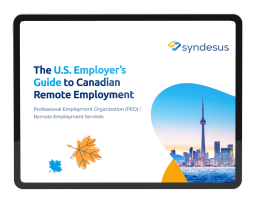US tech companies expanding into Canada enjoy access to a thriving economy, a growing tech talent pool, and streamlined immigration programs that can be a welcome relief from US immigration programs like the H-1B. Yet, while Canadian business culture shares many similarities with the US, navigating the major differences in employment law is essential to make sure the foreign business is compliant.
If a US company wants to open a Canadian office, they will need to make sure they have the right staff to help with administration, especially employment laws, HR, payroll, and more, which can be a financial and logistical burden. Partnering with a Canadian Professional Employment Organization (PEO) can offer the support needed for a smooth transition and allow the company to focus on hiring talent and managing the business.
In this article, we highlight some of the major differences between US and Canadian employment and why, in some cases, a US company may want to leverage a Canadian PEO to help handle some of the technical aspects of having a Canadian office.
Key employment law differences between the US and Canada
In the US, employment rules are split between local, state, and federal levels, making things a bit complicated. But in Canada, it’s a bit simpler. Provinces handle most employment matters, except for certain industries overseen by the federal government. Each province has its own rules — they’re mostly standard across the country — except in Quebec, which has a civil law system, unlike the common law system elsewhere in Canada.
Canada tends to lean more towards protecting employees, especially when it comes to things like accommodation rights, restrictions on what employees can and can’t do, and how terminations are handled.
At the end of the day, companies should know the key differences between employment in the US and Canada before opening a Canadian office, as minor differences in American and Canadian employment can pose significant legal risks. Please note, this article is not legal advice, and if you have questions regarding employment law in either the US or Canada, please contact a qualified employment attorney!
Let’s dive in.
Employment agreements and contracts
In Canada, written employment contracts are not merely recommended but considered standard practice, which isn’t always the case in the US. Companies that start operations in Canada shouldn’t rely on the existing employment agreements they use in the US, as many clauses related to pay, dismissal, and vacation time may differ.
There are also different rules with regard to what counts as an independent contractor and what counts as an employee. Employers have to be careful not to be liable for a contract worker’s vacation pay, overtime, and other statutory minimums. It’s always best to work with a professional who understands Canadian employment laws when drawing up contracts for staff in Canada.
Canadian termination vs. at-will employment
Unlike the common at-will employment system in the US, wherein both employer and employee can generally terminate the relationship without cause, Canada operates differently. Except when ‘just cause’ exists (indicating egregious misconduct), Canadian workers are usually entitled to substantial prior notice of termination or otherwise receive monetary compensation in lieu of that notice. The required length of notice depends on several factors, such as the employee’s tenure, role, age, and ease of finding comparable work. Incorrectly handling termination could easily trigger wrongful dismissal claims against an employer, so consulting with a legal professional first is advised.
Compensation
There are many ways the US and Canada differ regarding benefits and compensation. Canada’s federal minimum wage, like the US, can differ by province or territory. Employers need to observe the higher applicable rates based on where the work occurs. Likewise, salary structures, bonus schemes, and equity-based compensation need careful alignment with fair practice rules within Canadian provinces.
Another key difference is that employers in Canada are required to keep hold of payroll records for six years, whereas it can differ in the US at the federal level, though the IRS (the US’s main tax agency) requires payroll records to be kept for four years.
In the US, employers with 50 or more employees are required to provide their employees with health insurance, or risk paying a fine to the IRS. In Canada, because Canadian provinces provide universal health care, health insurance is not mandatory. However, many employers offer supplemental insurance as an employment benefit.
Overtime rules
Unlike the US, Canada doesn’t have “exempt” and “non-exempt” jobs for overtime. Most Canadian employees, regardless of salary or title, are entitled to overtime pay unless a specific exemption applies. Working beyond a pre-established limit (typically 40-44 hours per week) incurs mandatory overtime pay at the rate of “time-and-a-half.”
Careful oversight and adherence to overtime rules are important in Canada to avoid breaching employment law, because even if a job doesn’t fit a standard overtime exemption, employers and employees can agree on ways to lower overtime costs, such as paid time off in lieu, in an employment contract.
Vacation policy
Canadian federal law stipulates a legal minimum for paid vacation accrual, ordinarily starting at a baseline of two weeks per year. An employee’s vacation entitlements will also grow progressively throughout the employee’s duration of service. Additionally, statutory holidays add to the overall paid time off available. This contrasts with the United States, where the federal level lacks paid vacation mandates, and time off is often provided as a benefit.
Working with a PEO can streamline operations in Canada
Navigating the intricacies of Canadian employment law can be a significant hurdle for foreign companies looking to start an entity in Canada, whether that’s unfamiliar regulations regarding parental leave, sick leave, and overtime pay or complex payroll, tax, and Canada Revenue Agency submissions.
In this scenario, US companies seriously looking to open an office in Canada should consider working with a PEO that has a deep understanding of Canada’s labor laws, tax laws, immigration laws, HR rules, work culture, and more, to streamline business operations and ensure compliance with Canadian law. Especially in the early days of opening a new entity in a foreign country.
A PEO provides comprehensive business management solutions for small to mid-sized companies. They require the business to have a legal entity in the foreign country they support, and then the PEO ensures smooth functioning of the business in that country. The legal entity itself, the employees’ liability, and their work responsibilities remain with the company.
A Canadian PEO can manage the nuances of Canadian payroll processing, including correct deductions and timely tax remittance. This helps avoid errors that could invite government penalties and on the flip side, can help maximize potential tax benefits. They also have localized HR knowledge, ensuring employment contracts follow provincial norms and address aspects like hiring, termination notices, benefit structures, and anti-discrimination protections.
Working with a PEO minimizes risk, reduces administrative burdens, and frees up the US company’s resources to focus on growth and strategic initiatives, hire top tech and sales talent, and otherwise make the most of their Canadian presence.
Syndesus can help US businesses open an office in Canada compliantly
Syndesus, a Canadian company with extensive expertise in managing Canadian operations for US and global clients, can provide a streamlined, comprehensive PEO solution, whatever the situation. Syndesus helps companies with PEO services, including immigration, benefits, HR, and payroll. Your administrative processes are taken care of while you focus on expanding your workforce and moving your company forward.
Reach out to us to learn more about how we can help you!

About Marc Pavlopoulos
Marc Pavlopoulos is the CEO and Founder of Syndesus, a Professional Employer Organization that provides PEO services for US companies seeking to employ workers remotely in Canada, builds engineering teams in Canada for VC-backed startups in the US, and set-up remote offices in Canada for US companies. Additionally, Syndesus can assist foreign-born tech workers (and their US employers) with options for working remotely in Canada if they cannot stay in the US due to immigration/work visa issues.
As an American who has moved to Canada twice (for grad school and for work), Marc understands the challenges involved in starting a new life in a new country. Marc is a son of an immigrant and has great respect for people who leave their home country and seek a better life in the US or Canada.
Marc’s goal is to do everything he can to help those individuals achieve their dreams. Marc also has a second venture (Path to Canada) which helps foreign-born technical workers who cannot stay in the US (for immigration reasons) get a job and work authorization to work in Canada.




